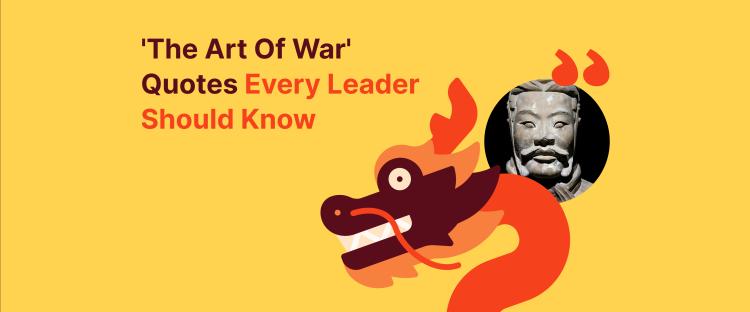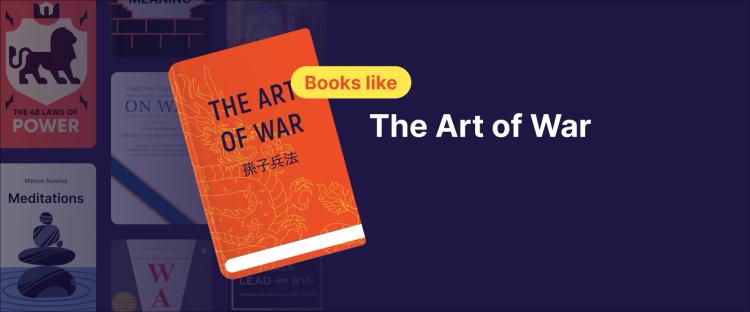Over two thousand years ago, Sun Tzu, a military strategist and army general from ancient China, wrote "a war guide for beginners." He targeted the aristocratic circles, who lacked knowledge but whose finances he needed. The general kept his tone light yet persuasive. Learn from 'The Art of War' on how to win without fighting altogether.
Key 'Art of War' principles:
Sun Tzu's goal was simple: encourage donations and show potential donors they needed to study to qualify as his advisors. His key recommendations included:
Strategic thinking and planning - Plan carefully and be aware of all factors before you act.
Know your enemy and yourself - Understand your own strengths and your opponent's situation to reduce losses.
Maintain adaptability - Be flexible and change your plans based on new developments and the enemy's actions.
Importance of intelligence (spies) - Collect all the facts and data about your opponent to make informed decisions.
Deception and surprise - Use clever tactics to hoodwink the enemy and take advantage of their weaknesses.
Avoid protracted conflicts - Aim for quick and clear actions to save resources and maintain morale.
Winning without fighting - Try to reach your goals through strategy and intelligence instead of direct battles.

Why is "winning without fighting" better than victory at all costs?
The answer is simple: real victory is not about how much you gain but how much you lose in the process. War is complicated and requires considering historical experience and careful planning to bring the loss count down. Sun Tzu encourages us to be like a "heaven-born captain," a leader with natural tactical genius and strategic mindset:
"He who can modify his tactics in relation to his opponent and thereby succeed in winning, may be called a heaven-born captain."
Original: "能因敵變化而取勝者,謂之神。"
To succeed without "calling for desperate measures," strategic thinking must go hand in hand with making the most out of the "know your enemy from head to toe" and staying adaptable. Let's explore Sun Tzu's ideas while smiling at all those memes he inspired.
Best of Sun Tzu's 'Art of War' principles to win in work and personal life
The following principles, which underpin Sun Tzu's strategic philosophy, may come in handy when you work on your strategy for the next professional or personal phase or prepare to address a conflict.
1. Strategic thinking and laying plans (始计, "stratagem or strategic military maneuvers")
One of the first principles the general emphasizes is the significance of planning every action and decision before initiating military operations. You must be fully aware of both sides' circumstances, resources, and potential resistance levels.
"Though the enemy is stronger in numbers, we may prevent him from fighting. Scheme so as to discover his plans and the likelihood of their success."
Original: "敵雖衆,可使無鬪。故策之而知得失之計。"
Sun Tzu acknowledges that understanding this is crucial, as victory is frequently determined through diligent thought and preparation.
2. Getting to know your enemy and yourself (知彼知己, "know yourself and your enemy")
A key idea in 'The Art of War' is the humanity of knowing your enemy and your own potential — to prevent heavy losses of lives on both sides.
"Hostile armies may face each other for years, striving for the victory which is decided in a single day. This being so, to remain in ignorance of the enemy's condition simply because one grudges the outlay of a hundred ounces of silver in honors and emoluments is the height of inhumanity."
Original: "相守數年,以爭一日之勝,而愛爵祿百金,不知敵之情者,不仁之至也。"
This quote means you should understand the enemy's situation and have a realistic view of your abilities, even when your opponent presents with seemingly inferior forces.
3. Maintaining adaptability when waging war (兵形, "military tactics, soldier formation")
Sun Tzu reminds readers to stay flexible and open-minded. It's all about upgrading our plans based on what's happening while keeping up with the overall strategy.
"By altering his arrangements and changing his plans, he keeps the enemy without definite knowledge. By shifting his camp and taking circuitous routes, he prevents the enemy from anticipating his purpose."
Original: "易其事,革其謀,使人無識;易其居,迂其途,使人不得慮。"
Staying updated on how the enemy (the opposing side in a conflict) moves and ready to change gears can make all the difference.
4. Why intelligence matters: Spies rock! (用間, the use of spies)
Sun Tzu drives home the message of how important it is to gather intel. In one of the chapters, he discusses how understanding what your opponent is planning can greatly affect the outcome of a battle.
"That the impact of your army may be like a grindstone dashed against an egg — this is effected by the science of weak points and strong."
Original: "兵之所加,如以碫投卵者,虛實是也。"
In today's business world, this means doing thorough research on the market, keeping an eye on your competitors all the time, and analyzing important information.
5. Deception and surprise as "smart" tactics (兵勢, "tactical dispositions")
'The Art of War' also discusses using clever tricks to keep the enemy guessing. Hiding your true plans, pretending to be weak when you're actually strong, and playing up your strength when you're not may give you a tactical advantage.
"All warfare is based on deception."
Original: "兵者,詭道也。"
You can "outsmart" the other side and seize a chance for efficient surprise attacks on their weak spots.
6. Avoid protracted conflicts if possible (作戰, "waged battles")
Sun Tzu highlights how costly prolonged battles can be, draining both human and material resources. He advises taking swift, bold action to hit those goals quickly. The idea is to cut out those drawn-out struggles like besieging as they deplete energy, resources, and morale.
"The quality of decision is like the well-timed swoop of a falcon which enables it to strike and destroy its victim."
Original: "鷙鳥之疾,至於毀折者,節也。"
A quick move can keep the enemy from regrouping and flip the game in your favor. Think of it like a falcon swooping in perfectly to make its strike — it's all about timing for maximum impact and depriving the enemy of the chance to regroup to avoid "a rout," or a chaotic retreat.

Sun Tzu's 'The Art of War': Whens, hows, and whys
Sun Tzu's 'The Art of War' is a product of fierce military and political struggles permeating all spheres of life in ancient China of the Warring States epoch. Scholars agree that the text is usually associated with 春秋战国 (Chūnqiū zhànguó), the late Spring and Autumn periods, approximately around 771 to 476 BCE.
Sun Tzu wrote this work to support his monarchs and military leaders, enabling them to turn every initial condition on the battlefield to their advantage. More than any other asset, the author valued intelligence (use of spies), a hybrid war of manipulation and intimidation, avoiding long fights that drain resources, and a well-crafted strategy.
"With respect to military method, we have, firstly, Measurement; secondly, Estimation of quantity; thirdly, Calculation; fourthly, Balancing of chances; fifthly, Victory."
Original: "兵法:一曰度,二曰量,三曰數,四曰稱,五曰勝。"
'The Art of War' consists of thirteen chapters covering various elements of warfare, like terrain analysis, troop deployment, discipline, and moral law. Key themes include laying plans, studying each other's arsenals and potentials, avoiding undue conflict, being perceptive and ready to move. Basically, a treatise guide for our "hustle and bustle" life.
How can Millennials and Gen Z apply 'Art of War' principles today?
Throughout history, there has always been a battle for the youth to fight: education, careers, or relationships. For millennials and Gen Z, the list has gotten longer, with social media being one of the most demanding additions. We must think strategically and plan carefully to meet our needs while facing these challenges.

To find a job, learn tech, and defy the economic crisis
Sun Tzu teaches the young generation to recognize their strengths and weaknesses and stay aware of all potential consequences. This will nurture their adaptability as they compete with rapid tech progress like AI and the more demanding job market.
"Amid the turmoil and tumult of battle, there may be seeming disorder and yet no real disorder at all; amid confusion and chaos, your array may be without head or tail, yet it will be proof against defeat."
Original: "紛紛紜紜,鬥亂而不可亂也;渾渾沌沌,形圓而不可敗也。"
Sun Tzu's idea is that chaos doesn't have to confuse or set you back, but rather motivate you to see new opportunities. Doesn't that sound encouraging in an era of unending financial anxiety, fueled by political decisions like tariff policies?
2. To spot fake news, especially in politics and economics
Sun Tzu highlighted the importance of understanding and gathering information in battles. He encourages younger generations, like millennials and Gen Z, to take a fresh look at their ability to judge what they see online.
"Therefore, just as water retains no constant shape, so in warfare there are no constant conditions."
Original: "故兵無成勢,無恒形。"
In our current digital world, it's crucial to tell the difference between trustworthy sources and false information so that you can effectively handle challenges and competition and adapt swiftly to any changes in the rules.
3. To stay safe, bold, and united online
This generation values teamwork and strives to avoid conflicts, reflecting Sun Tzu's belief in achieving success without face-to-face fights.
"For it is the soldier's disposition to offer an obstinate resistance when surrounded, to fight hard when he cannot help himself, and to obey promptly when he has fallen into danger."
Original: "故兵之情:圍則禦,不得已則鬥,過則從。"
'The Art of War' explains how influence works; it's ideally "transferable" knowledge applies to online communities the way it works for in-person social engagements. Leadership and working together still remain the most reliable tools to strengthen any group's potential.
4. To express yourself with confidence and empathy
In this age of online communication, millennials and Gen Z truly excel at expressing their ideas. They use Sun Tzu's strategies "to read their audience" and shape the narratives in non-malicious yet beneficial ways. Thus, just like centuries ago, 'The Art of War' empowers everyone to take every step confidently yet leaving a room for empathy.
"When you surround an army, leave an outlet free. Do not press a desperate foe too hard."
Original: "圍師必闕,窮寇勿迫。"
As a bonus, learning from Sun Tzu's counterintuitive style helps readers connect ancient wisdom with modern internet culture. This idea gave birth to millions of hilarious caricatures of the author's strategic notes.
5. To avoid confrontation in a conflict and get your way
Imagine achieving your desired outcome without getting into arguments or fights, even when the situation gets tough. Sounds amazing, right? The goal here is to shake your opponent's resolve using smart strategies, mind games, and throwing wrenches into their plans without actually going into a head-to-head battle.
"Unhappy is the fate of one who tries to win his battles and succeed in his attacks without cultivating the spirit of enterprise; for the result is waste of time and general stagnation."
Original: "夫戰勝攻取,而不修其功者凶,命曰「費留」。"
If confrontation is inevitable, it should always be a well-planned move. Sneaky plots, flanking plays, and clever distractions might postpone your immediate progress, but they will weaken your opponent's alert and lead to your early victory.
6. To calculate your statistical probability of winning
Some of the most straightforward tactics left by Sun Tzu are number-based, for cases when you're organizing troops or your team:
10 to 1: Time to surround them!
5 to 1: Let's attack!
2x as many: Split up your forces for effectiveness.
x = y (you are even): Approach with caution and a solid plan.
x < y (you are outnumbered): Avoid direct confrontation and wait.
x << y (very outnumbered): Sometimes, a wise retreat is the best option.
"Hence, the enlightened ruler is heedful, and the good general full of caution."
Original: "故明主慎之,良將警之。"
7. To be well-informed & evaluate the situation from all angles
In Chapter Twelve, Sun Tzu talks about using fire and weather conditions as a strategy to destroy enemy camps and supplies. Careful planning and evaluation are always the core of this and any tactic. For example, before attacking with fire, Sun Tzu recommends considering at least five possible developments:
"When fire breaks out inside the enemy's camp, respond at once with an attack from outside."
Original: "火發於內,則早應之於外。"
"If there is an outbreak of fire, but the enemy's soldiers remain quiet, bide your time and do not attack."
Original: "火發而其兵靜者,待而勿攻。"
"When the flames' force has reached its peak, follow up with an attack if that is practicable; if not, stay where you are."
Original: "極其火力,可從而從之,不可從則止。"
"If it is possible to make an assault with fire from the outside, do not wait for it to break out from the inside, but deliver your attack at a favourable moment."
Original: "火可發於外,無待於內,以時發之。"
"When you start a fire, be to windward of it. Do not attack from the leeward."
Original: " 火發上風,無攻下風。"
In everyday life, "climate conditions" can refer to political and economic situations. At the same time, "strategic fire" represents bold actions or plans that can lead to success or, if timing is bad, end in failure. Ultimately, winning relies on having a solid plan, being creative in how you mislead your opponents, and keeping your strategy flexible.
Where can you apply Sun Tzu's principles today?
The enduring relevance of 'The Art of War' continues to shine in our modern world. It is perfectly applicable to so many environments and situations you may face today! Let's review a few examples.

When you prepare for negotiations or craft a business strategy
Understanding your opponent's needs and weaknesses may sometimes overshadow a strong strategic plan for negotiations. Knowing unique strengths of what you're offering and flexible strategies increase your chances of success. Netflix lost negotiations with Blockbaster but won the market by adapting to changing media consumption trends.
When you manage my company's unit as a leader
From 'The Art of War' perspective, great leaders would master Sun Tzu's principles by investing time in studying their subordinates. They are always prepared to face a crisis and adapt right away. Honoring rules and values is crucial when managing the team members and encouraging employees to strive for excellence in their roles.
When you make decisions in your personal life
Making personal choices can be challenging, don't you think? The wisdom of Sun Tzu can help you with this. By carefully considering your options, each side' potentials, and staying adaptable when unexpected situations arise, you can improve your chances of a positive outcome. Plus, those funny Sun Tzu memes are always good for a laugh.
When you participate in political debates
Gaining an understanding of diplomacy involves studying the behaviors of people from various cultures. It is essential to prepare by learning all the details, including body language specifics. Studying how people usually act in government settings connects to Sun Tzu's advice to know your opponent and keep your emotions in check.
When you play for or coach a sports team
Successful coaches and athletes often borrow from military strategy by carefully studying their opponents. This means being aware of their skills, personalities, and values. Athletes and coaches must also be flexible and adjust their "military tactics and strategies" based on what's happening. Thoughtful "adaptability" response is essential.
Sign of the times: Learn more on 'The Art of War' with Headway
Sun Tzu's 'The Art of War' is a classic piece of strategy writing that many generations enjoy, including Gen Z and millennials today. Its ideas about conflict, competition, and reaching goals have withstood ages and reached the modern social media era, where human nature still prevails.
The book teaches us that careful planning, understanding our opponents, and adaptability are essential to win in both life and war. The general repeatedly highlighted that "supreme excellence" means breaking an opponent's will without fighting. To do this, the person must "ponder and deliberate" or " 懸權而動。" before taking an action.
To learn more about this valuable Chinese text and improve your strategic thinking via 'The Art of War' principles, we suggest downloading the Headway app. Let's explore the key lessons from Sun Tzu in audiobook format and move on to the reading list "Top 14 Must-Read Books Like 'The Art of War' for Strategy Enthusiasts."

Frequently Asked Questions
Who was Sun Tzu?
Sun Tzu was an on-duty general and strategist who served around 544-496 BCE. He is a key figure in Chinese military history and has greatly influenced strategic theory and war tactics. Sun Tzu's approach is often compared to Niccolò Machiavelli: first emphasized conflict avoidance and intelligence, second favored power and ruthlessness.
What are the key points in 'The Art of War'?
Key principles emphasize adaptability in decision-making, effective strategy, psychological warfare, and the use of intelligence and deception when developing attack methods.
Are 'The Art of War' and 'The 33 Strategies of War' basically the same?
They are different but essentially very close. Works like Robert Greene's 'The 33 Strategies of War' offer a new interpretation of Sun Tzu's concepts through the lens of modern times. This edition highlights the ongoing relevance of Sun Tzu's ideas in both military and non-military conflicts.
What are the 5 fundamentals of The Art of War?
The five fundamentals of The Art of War refer to the core strategic pillars emphasized by Sun Tzu:
Strategic Planning – Every action begins with thorough assessment and calculated decisions.
Knowing Yourself and the Enemy – Awareness of both your strengths and your opponent’s weaknesses is key to minimizing risk.
Adaptability – Flexibility in changing conditions is essential to long-term success.
Deception – Misleading the enemy is a powerful way to gain advantage without direct confrontation.
Efficiency in Conflict – The goal is to win swiftly and avoid prolonged engagements that drain resources.
Sun Tzu’s framework encourages leaders to think proactively and win by intellect rather than brute force.
What are the 5 key points of The Art of War?
The five key points of Sun Tzu’s The Art of War can be summarized as:
Victory without battle is the highest form of excellence.
All warfare is based on deception—appear weak when strong and vice versa.
Know your enemy and know yourself to ensure success in countless battles.
Adapt to changing conditions—there is no fixed strategy in war.
Use strategy to conserve resources—avoid direct conflict when possible.
These principles apply to leadership, negotiations, business, and personal decision-making in today’s world.
What is Sun Tzu's most famous quote?
Sun Tzu’s most famous quote is:
“All warfare is based on deception.”
This quote reflects the heart of his strategic philosophy. Rather than relying on brute strength, Sun Tzu advocates for misleading the enemy, masking your intentions, and outmaneuvering your opponent mentally. It’s a principle that has influenced military commanders, business leaders, and political strategists for centuries.













